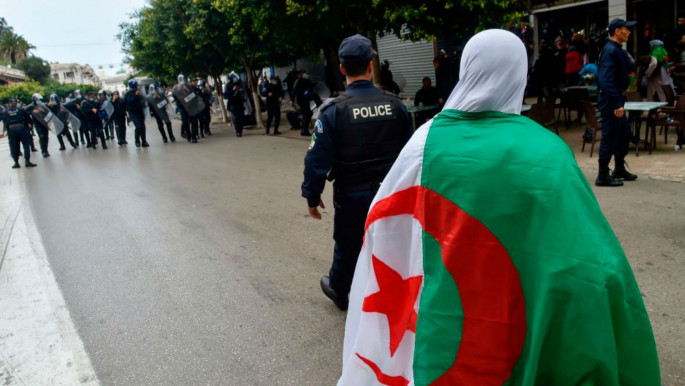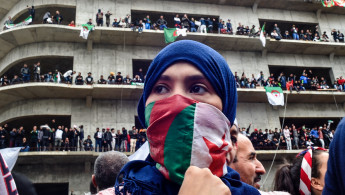Algeria's tightening grip on the Hirak protest movement
Two key leaders of Algeria's Hirak protest movement, Karim Tabbou and Samir Benlarbi, will soon be released by presidential pardon, the leader of an opposition party said this week.
Tabbou is an emblematic figure of the movement, which initiated peaceful rallies forcing long-time authoritarian ruler Abdelaziz Bouteflika to step down in April 2019.
Founder of the now banned Social and Democratic Union party, he was first arrested in September of last year on charges that included "undermining national unity" and has been in prolonged solitary confinement ever since. His court trial, which should have been held on Monday, was deferred until 29 June. It had been already postponed twice in April.
The political leader was expected to be released at the end of March to serve his suspended sentence, after spending six months in prison.
However, he was sentenced to one-year imprisonment on 24 March and a fine of 50,000 Algerian dinars ($400) for "incitement to violence" and "harming national security" in connection with a speech he shared on his political party's Facebook page where he criticised the role of the army in politics.
Human rights lawyers have deplored the trial as unfair due to a lack of notification for the defence and the collapse of the defendant in the court room.
 |
Opposition leaders, civil society activists, journalists and demonstrators have been increasingly persecuted by Algerian authorities amid the Covid-19 pandemic |  |
Along with Tabbou, many opposition leaders, civil society activists, journalists and demonstrators have been increasingly persecuted by Algerian authorities for expressing critical opinions in the midst of the Covid-19 pandemic.
"Algeria using cover of #covid to tighten reins on protest movement, issue harsh sentences against prisoners. Dozens of protesters arrested over the past year remain jailed while almost 10K ordinary criminals have been set free," Sarah Leah Whitson, lawyer and former director of Human Rights Watch's Middle East and North Africa division, tweeted at the end of April.
Rights groups and Algerian civil society have expressed serious concern over the government stepping up its clampdown against dissenters under the cover of coronavirus.
 |
|
| Read more: Algeria regime exploits virus to defeat protesters |
On 17 March, Algeria's president Abdelmadjid Tebboune ordered a ban on all public gatherings as part of the government's measures to contain the virus' spread. The Hirak movement had already suspended street protests in light of the global health crisis
Since late February, when the opposition movement marked its one-year anniversary, activists and critics across the country have been more frequently arrested, summoned for questioning or sentenced to jail.
"The Algerian regime has made a big mistake by turning more repressive against its own people," Rabah Arkam, an Algerian human rights activist, told The New Arab.
"It has exploited the confinement to try to silence the free voices, a bad way to handle the situation during the pandemic".
Recently, the Algerian League for the Defense of Human Rights (LADDH) observed that authorities have routinely resorted to abusive and provisional detention with procedures fully disregarding the rights guaranteed by Algeria's judicial system, and opposing Algeria's obligations towards international treaties and conventions.
The group also found that the majority of political detainees face vague charges such as "undermining national unity", "harming national security" and "harming the army's morale", often based on social media posts.
"The government has taken advantage of this health truce to take on Hirak activists to tighten the grip," Said Salhi, vice-president of LADDH, said. "Almost every day, we're seeing someone either placed under a committal order or trialled".
 |
The Hirak movement initiated peaceful rallies forcing long-time authoritarian ruler Abdelaziz Bouteflika to step down in April 2019 |  |
The Hirak movement has continued to call for democracy and the end of the military regime for more than a year. Opponents largely denounced the presidential election in December as a sham, viewing all the running candidates as "part of the ruling establishment".
The most well-known and influential figures of the Hirak movement and independent journalists have been the main target of 'Le Pouvoir' (The Power).
Prominent journalist Khaled Drareni, a correspondent for Reporters Without Borders (RSF) who has covered the demonstrations in the capital Algiers since the beginning, is currently held in pre-trial detention.
He was arrested twice in March because of his reporting, charged with "incitement to unarmed gathering" and "damaging national integrity". His last detention order was handed down despite all courts being closed due to Covid-19.
Samir Benlarbi and Slimane Hamitouche, both leading members of the popular movement, have been detained since March for "harming national unity" and "illicit gathering".
 |
|
| Read more: Covid-19 gives Algeria's repressive state the edge, for now |
Political opponent Rachid Nekkaz was arrested in December for a video shared on social networks in which he called on the Algerians to attack the deputies who were then preparing to vote on the hydrocarbons law. He faces the death penalty, accused of heavy charges including "incitement of citizens to take up arms".
Toufik Hassani, a famous former police officer, has been arrested on several occasions after taking a public position in favour of the Hirak movement. His case is still under investigation. Opposition militant Amira Bouraoui was convicted to two months in prison and a fine of 200,000 Algerian dinars ($1,550) last week.
But besides the persecution of high-profile dissidents, there has been a series of arrests of youths related to content published on social networks.
Walid Kechida, a 25-year-old supporter of the Hirak movement, was jailed at the end of April, for creating a Facebook page where he posted satirical anti-government memes. He risks five years in prison, facing allegations of offense against the president and an attack on religious laws.
Three young Algerian opposition activists were given lengthy prison sentences in May for their Facebook posts. One of the activists, Soheib Debagahi, was condemned to a one-year prison term after being charged with encouraging an illegal gathering, insulting an official body and publishing potentially damaging material. The other two, Larbi Tahar and Boussif Mohamed Boudiaf, were given jail sentences for one and a half years each on similar charges.
 |
We have a ruling class made of badly elected people who work exclusively for themselves, not for the Algerian people |  |
According to the last count by the National Committee for the Release of Detainees (CNLD), some 50 political detainees, most of them associated with the popular Hirak protests, are still in custody in Algeria.
Since February 2019, the total number of prosecutions of peaceful protesters has exceeded 1,400, according to local human rights groups and lawyers.
In spite of the ongoing pandemic, Algerian authorities have persisted in trying to muzzle dissent, and have targeted the free press, blocking a number of online media outlets in recent weeks.
Last week, the government extended its lockdown measures throughout most of the country until 13 June. Observers claim the decision is to avert the resumption of the weekly popular protests that have been suspended since March, which indicates authorities may well fear a comeback of the Hirak movement.
 |
|
| Read more: Human rights groups demand release of Algerian journalist as crackdown on press continues |
Arkam told The New Arab that the lockdown extension was "politically motivated", not due to health concerns. He believes the containment may be even protracted further. In his view, 'the Power' will continue to clamp down on, and attempt to "manoeuvre" and "divide" the protest movement simply because it is the same (old) authoritarian regime that has ruled the country since after independence from the French in 1962.
"Currently, we have a ruling class made of badly elected people who work exclusively for themselves, not for the Algerian people," the activist stressed. "Algerians are just peacefully demanding real change".
Salhi is confident the Hirak protesters will be back on the streets once Algeria ends its lockdown, which is why the regime insists on "trying to weaken" the opposition movement. He pointed out that it is a question of "political will".
"Since February 2019, we are seeking a transition toward democracy that must go beyond all individual or group calculations and guarantee the Algerian citizen his rights and freedoms," the human rights defender said.
In the middle of the coronavirus crisis, the Algerian presidency unveiled its constitutional reform project vowing to uphold more fundamental rights and public freedoms. This at a time when authorities are incarcerating and prosecuting anyone who speaks up and tells the truth.
"It is ironic, to say the least, to promise more rights and freedoms when, at the same time, Algerian jails are filling up," Dalia Ghanem, resident scholar at the Carnegie Endowment for International Peace, said in an interview with Jeune Afrique. "The long-awaited gesture would have been to release prisoners of conscience and activists as soon as the election was called."
Alessandra Bajec is a freelance journalist currently based in Tunis.
Follow her on Twitter: @AlessandraBajec



